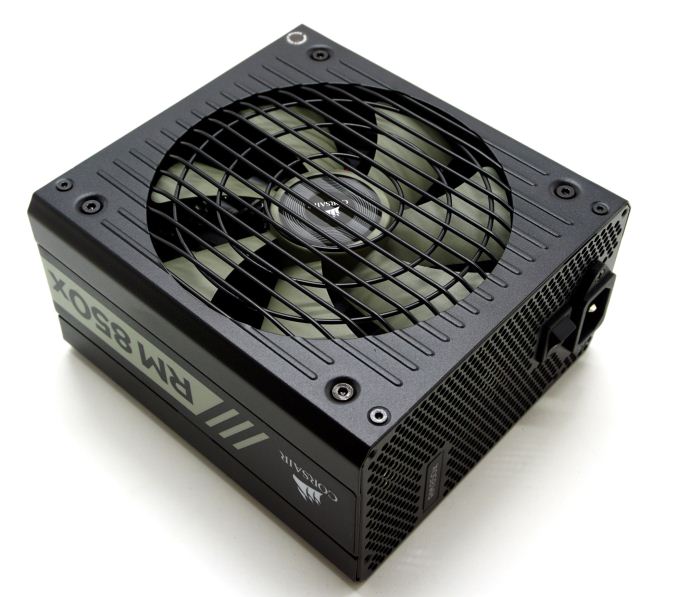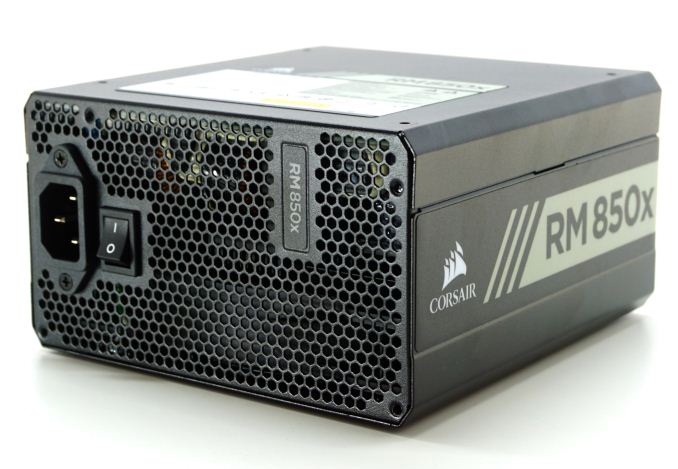The Corsair RM850x (2018) PSU Review: Exceptional Electrical Performance
by E. Fylladitakis on August 22, 2018 8:00 AM EST- Posted in
- Cases/Cooling/PSUs
- Corsair
- PSUs
- 850W
- Modular
Conclusion
Corsair's engineers designed the RMx series to offer a great balance between quiet operation, high quality electrical performance, and reasonable pricing. In practice, the series is bridging the gap between the value and the top-tier performance products that Corsair produces. In that respect it serves as an upgrade over the relatively simple but highly reliable TXM series, offering quieter operation without the high price tag of an AXi series unit.
The primary marketing point of the RMx series is quiet operation and the RM850x did not fail to deliver. Its fan does not even start with loads lower than 200 Watts, meaning that the RM850x will operate fanless while any modern PC is idling or performing simple everyday tasks, like browsing or media playback. For most users, the fan of the RM850x will only start when a performance graphics card is put to use, i.e. while gaming.
Although the primary selling point of the RM850x is its quiet operation, we cannot help it but point out that the electrical performance of the particular platform is exceptional. The RM850x greatly surpassed our initial expectations and delivered astonishing power quality during our testing, with figures that we usually see on products retailing for twice the price. We have no complaints regarding the electrical efficiency of the platform either, as it easily surpassed the 80Plus Gold certification requirements regardless of the input AC voltage.
The Achille's heel of the RM850x is its thermal profile design, which favors quiet operation over low operating temperatures. This works perfectly well for most scenarios, as the vast majority of users would never fully load a 850 Watt PSU for extended periods of time. As such, the RM850x rewards its owner with excellent acoustical performance, generating no noise when lightly loaded and retaining comfortable noise levels even when the load is high. However, if the load is excessive and the ambient temperature is high, the efficiency of the RM850x will degrade slightly, as the active components will start becoming stressed. But the only real-world scenario that matches these requirements is cryptocurrency mining, for which the RM850x clearly is not the best choice.
Corsair currently sells the new version of the RM850x for $130. The price is admittedly a bit high for an 80Plus Gold certified PSU, yet it's more than reasonable when taking its performance and the lengthy 10-year warranty into account. And if anything, Corsair is probably creating internal competition against themselves, as the RM850x offers astonishing electrical performance for a significantly lower price than the company's respective HX and AX units. So if you don't mind dropping one efficiency certification level – and merely to 80Plus Gold at that – then the RMx series ends up being an extremely attractive power supply even for high-end users.












14 Comments
View All Comments
austinsguitar - Wednesday, August 22, 2018 - link
picked this thing up for 99 dollars last week at best buy. Super quiet most of the time. Love it... capacitors in the wires are huge...Cellar Door - Wednesday, August 22, 2018 - link
It would cost Corsair less then $0.50 to include a ball bearing version o the fan.philehidiot - Thursday, August 23, 2018 - link
Do remember volume. That $0.50 might do a couple of things. Firstly when multiplied by a lot of units that becomes $0.50 x lots. Which is (($0.50)lots). Which is a lot. The other issue is if you push that onto the consumer then it may send the price over a psychological threshold which has been shown to lead to reduced overall sales. Whilst the individual is rational and when informed would rather spend $0.50 for the nice fan, the herd acts like a bunch of morons who need to be carefully led.This presents a problem because cows are stupid, but you want their milk.
Cellar Door - Thursday, August 23, 2018 - link
Terrible analysis - higher volume means lower overall costs. As Corsair already uses higher quality fans in other units.philehidiot - Wednesday, June 30, 2021 - link
My comeback is a few years late. But you can only reduce costs with economies of scale so far. Some parts are fundamentally more expensive and the producers still need to make a profit. Last company I saw focus purely on volume, relying on economies of scale, went very bust very quickly. As I said, it might be that psychological threshold or just plain budget that they have to keep under. The other models might have had room in the budget for the ball bearing fan. Or, quite possibly, the market for power supplies of this level just doesn't use the fan type as a discriminator. They use ripple, efficiency and so on.I trust that you won't be coming back to this several years down the line and shall therefore assume I win the argument. Victory!
austinsguitar - Saturday, August 25, 2018 - link
the fan is ball bearing?Batmeat - Wednesday, August 22, 2018 - link
Third paragraph had the word "bifurcated" in it back to back.Ryan Smith - Wednesday, August 22, 2018 - link
Thanks!mgabee - Thursday, August 23, 2018 - link
Best PSU, beside the EVGA G3 series of course. Jonnyguru makes Corsair PSUs more brilliant with this 2018 upgrade. I have the RM550x: the quality is insane, deadly silent, Vcore drop halved under load. It is definitely a 10yr long PSU with the best price/performance ratio.IgorM - Thursday, August 23, 2018 - link
I must disagree with crypto mining part. We have at least 3 Rmx 850 and at least 20 Rmx 1000 working almost a year with pretty harsh conditions, up to 43 C in the room, almost full load, and none died yet and works excellent. We also have LC power PSUs, because supply of Corsair was limited at the time, and they are dying often.